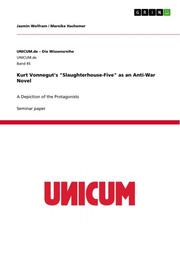Detailansicht
Kurt Vonnegut's 'Slaughterhouse-Five' as an Anti-War Novel
A Depiction of the Protagonists, UNICUM.de - Die Wissensreihe
ISBN/EAN: 9783656583226
Umbreit-Nr.: 6224072
Sprache:
Englisch
Umfang: 32 S.
Format in cm: 0.3 x 21 x 14.8
Einband:
kartoniertes Buch
Erschienen am 13.02.2014
Auflage: 1/2014
€ 17,95
(inklusive MwSt.)
Lieferbar innerhalb 1 - 2 Wochen
- Zusatztext
- Seminar paper from the year 2014 in the subject English Language and Literature Studies - Literature, grade: 1,0, Johannes Gutenberg University Mainz (Department of English and Linguistics), course: Slaughterhouse Five, language: English, abstract: The novel Slaughterhouse-Five, written by Kurt Vonnegut in 1969, is about Billy Pilgrim, a man, who has become unstuck in time, which means that he travels through different periods of his life. The novel starts with an autobiographical part, which is about Kurt Vonneguts life after the Second World War. In the following parts Vonnegut writes about Billy Pilgrim. The reader learns that as a young adult Billy Pilgrim is a soldier in the Second World War just like Kurt Vonnegut was. He survives this war with the help of other soldiers and later on he settles as a bourgeois civilian with his wife Valencia Merble and his two children. Kurt Vonnegut tells the reader that in the time of the Second World War Billy Pilgrim has come unstuck in time, and has been kidnapped by aliens from a planet called Tralfamadore. The reader gets to know Billy Pilgrim's life story as well as his personality. As a round character Billy is shown in different situations with all his emotions and thoughts. Vonnegut describes traumatic events in Billys childhood and also emotionally important events in his grown-up life, like his 18th wedding anniversary. After the awful situations Billy witnessed in the Second World War, for instance the Dresden bombing, and an airplane crash he survives, Billy says he was kidnapped by a flying saucer. This could be a sign of Billy Pilgrim suffering from Post Traumatic Stress Disorder (PTSD) which will be examined in the following text. Although the novel contains sad and cruel topics, the tone of the novel is generally sarcastic and unemotional. Billy Pilgrim's life and the literary style of Slaughterhouse-Five inevitably lead to the question: In How Far Does Kurt Vonnegut's Depiction of the Protagonists in Slaughterhouse-Five Contribute to the Novel Being an Anti-War Novel? Since Vonnegut's publishers call Slaughterhouse-Five one of the world's great antiwar books and Vonnegut himself promised his friend Mary O'Hare to write an anti-war novel, these statements will be examined in this essay.
- Autorenportrait
- Mareike Hachemer (Studienrätin der Fächer Englisch und Deutsch) studierte Germanistik, Anglistik, Philosophie und Erziehungswissenschaft an der Johannes Gutenberg-Universität Mainz mit den Schwerpunkten Neuere Literaturwissenschaft und Sprachwissenschaft. Hier untersuchte sie unter anderem die Darstellung verschiedener geistiger und psychsicher Krankheiten in der Literatur des 20. Jahrhunderts. Ihre Forschungsschwerpunkte liegen in der Kinder- und Jugendliteraturforschung und der Unterrichtsdidaktik. Seit 2008 ist Mareike Hachemer Redaktionsmitglied von interjuli, Zeitschrift für internationale Kinder- und Jugendliteraturforschung. Als Dozentin in German Studies thematisierte sie Kinder- und Jugendliteratur auch mit internationalen Studenten an der University of Otago in Dunedin, Neuseeland. seit 2010 veröffentlicht Mareike Hachemer auch didaktische Texte insbesondere zu Fremdsprachendidaktik und Literaturunterricht. Sie unterrichtet Deutsch und Englisch am Beruflichen Gymnasium und der Fachoberschule und absolviert eine Weiterbildung zur Lehrerin für Theater/Darstellendes Spiel.
